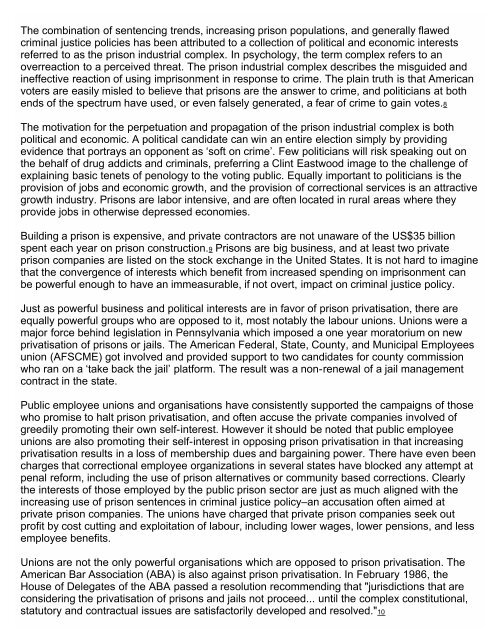prison privatisation in south africa issues, challenges and ...
prison privatisation in south africa issues, challenges and ...
prison privatisation in south africa issues, challenges and ...
Create successful ePaper yourself
Turn your PDF publications into a flip-book with our unique Google optimized e-Paper software.
The comb<strong>in</strong>ation of sentenc<strong>in</strong>g trends, <strong>in</strong>creas<strong>in</strong>g <strong>prison</strong> populations, <strong>and</strong> generally flawed<br />
crim<strong>in</strong>al justice policies has been attributed to a collection of political <strong>and</strong> economic <strong>in</strong>terests<br />
referred to as the <strong>prison</strong> <strong>in</strong>dustrial complex. In psychology, the term complex refers to an<br />
overreaction to a perceived threat. The <strong>prison</strong> <strong>in</strong>dustrial complex describes the misguided <strong>and</strong><br />
<strong>in</strong>effective reaction of us<strong>in</strong>g im<strong>prison</strong>ment <strong>in</strong> response to crime. The pla<strong>in</strong> truth is that American<br />
voters are easily misled to believe that <strong>prison</strong>s are the answer to crime, <strong>and</strong> politicians at both<br />
ends of the spectrum have used, or even falsely generated, a fear of crime to ga<strong>in</strong> votes.8<br />
The motivation for the perpetuation <strong>and</strong> propagation of the <strong>prison</strong> <strong>in</strong>dustrial complex is both<br />
political <strong>and</strong> economic. A political c<strong>and</strong>idate can w<strong>in</strong> an entire election simply by provid<strong>in</strong>g<br />
evidence that portrays an opponent as ‘soft on crime’. Few politicians will risk speak<strong>in</strong>g out on<br />
the behalf of drug addicts <strong>and</strong> crim<strong>in</strong>als, preferr<strong>in</strong>g a Cl<strong>in</strong>t Eastwood image to the challenge of<br />
expla<strong>in</strong><strong>in</strong>g basic tenets of penology to the vot<strong>in</strong>g public. Equally important to politicians is the<br />
provision of jobs <strong>and</strong> economic growth, <strong>and</strong> the provision of correctional services is an attractive<br />
growth <strong>in</strong>dustry. Prisons are labor <strong>in</strong>tensive, <strong>and</strong> are often located <strong>in</strong> rural areas where they<br />
provide jobs <strong>in</strong> otherwise depressed economies.<br />
Build<strong>in</strong>g a <strong>prison</strong> is expensive, <strong>and</strong> private contractors are not unaware of the US$35 billion<br />
spent each year on <strong>prison</strong> construction.9 Prisons are big bus<strong>in</strong>ess, <strong>and</strong> at least two private<br />
<strong>prison</strong> companies are listed on the stock exchange <strong>in</strong> the United States. It is not hard to imag<strong>in</strong>e<br />
that the convergence of <strong>in</strong>terests which benefit from <strong>in</strong>creased spend<strong>in</strong>g on im<strong>prison</strong>ment can<br />
be powerful enough to have an immeasurable, if not overt, impact on crim<strong>in</strong>al justice policy.<br />
Just as powerful bus<strong>in</strong>ess <strong>and</strong> political <strong>in</strong>terests are <strong>in</strong> favor of <strong>prison</strong> <strong>privatisation</strong>, there are<br />
equally powerful groups who are opposed to it, most notably the labour unions. Unions were a<br />
major force beh<strong>in</strong>d legislation <strong>in</strong> Pennsylvania which imposed a one year moratorium on new<br />
<strong>privatisation</strong> of <strong>prison</strong>s or jails. The American Federal, State, County, <strong>and</strong> Municipal Employees<br />
union (AFSCME) got <strong>in</strong>volved <strong>and</strong> provided support to two c<strong>and</strong>idates for county commission<br />
who ran on a ‘take back the jail’ platform. The result was a non-renewal of a jail management<br />
contract <strong>in</strong> the state.<br />
Public employee unions <strong>and</strong> organisations have consistently supported the campaigns of those<br />
who promise to halt <strong>prison</strong> <strong>privatisation</strong>, <strong>and</strong> often accuse the private companies <strong>in</strong>volved of<br />
greedily promot<strong>in</strong>g their own self-<strong>in</strong>terest. However it should be noted that public employee<br />
unions are also promot<strong>in</strong>g their self-<strong>in</strong>terest <strong>in</strong> oppos<strong>in</strong>g <strong>prison</strong> <strong>privatisation</strong> <strong>in</strong> that <strong>in</strong>creas<strong>in</strong>g<br />
<strong>privatisation</strong> results <strong>in</strong> a loss of membership dues <strong>and</strong> barga<strong>in</strong><strong>in</strong>g power. There have even been<br />
charges that correctional employee organizations <strong>in</strong> several states have blocked any attempt at<br />
penal reform, <strong>in</strong>clud<strong>in</strong>g the use of <strong>prison</strong> alternatives or community based corrections. Clearly<br />
the <strong>in</strong>terests of those employed by the public <strong>prison</strong> sector are just as much aligned with the<br />
<strong>in</strong>creas<strong>in</strong>g use of <strong>prison</strong> sentences <strong>in</strong> crim<strong>in</strong>al justice policy–an accusation often aimed at<br />
private <strong>prison</strong> companies. The unions have charged that private <strong>prison</strong> companies seek out<br />
profit by cost cutt<strong>in</strong>g <strong>and</strong> exploitation of labour, <strong>in</strong>clud<strong>in</strong>g lower wages, lower pensions, <strong>and</strong> less<br />
employee benefits.<br />
Unions are not the only powerful organisations which are opposed to <strong>prison</strong> <strong>privatisation</strong>. The<br />
American Bar Association (ABA) is also aga<strong>in</strong>st <strong>prison</strong> <strong>privatisation</strong>. In February 1986, the<br />
House of Delegates of the ABA passed a resolution recommend<strong>in</strong>g that "jurisdictions that are<br />
consider<strong>in</strong>g the <strong>privatisation</strong> of <strong>prison</strong>s <strong>and</strong> jails not proceed... until the complex constitutional,<br />
statutory <strong>and</strong> contractual <strong>issues</strong> are satisfactorily developed <strong>and</strong> resolved."10
















